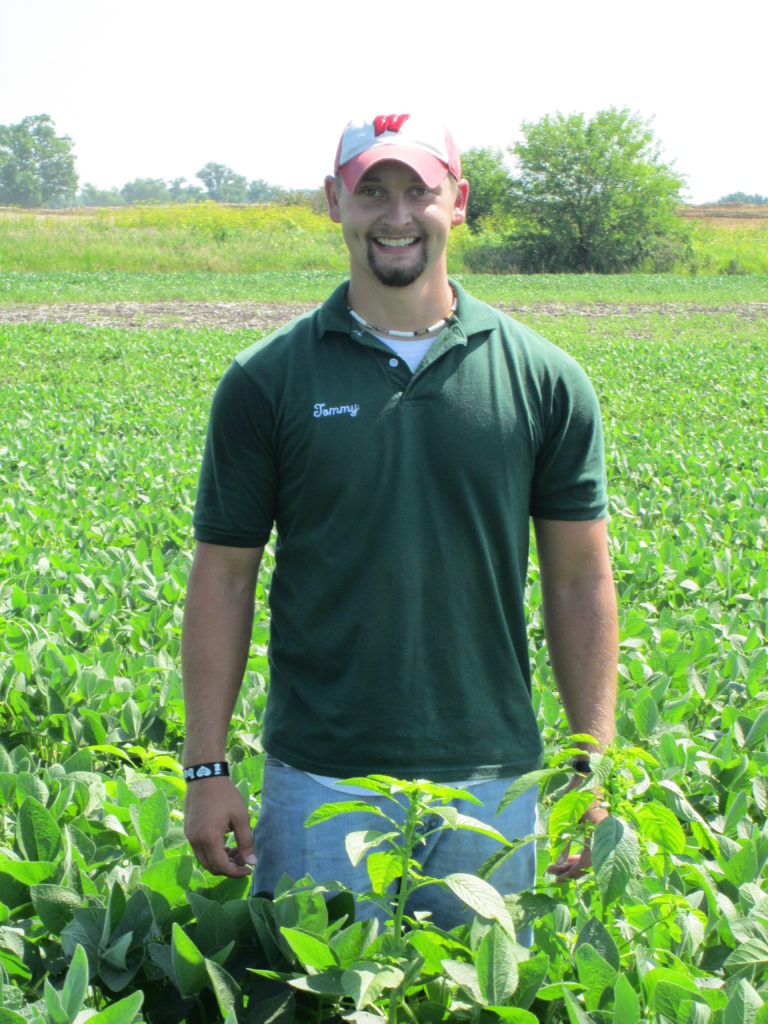Jan 15, 2019Wisconsin scientist to try his hand at Arkansas weeds
The newest University of Arkansas System Division of Agriculture weed scientist said he expects to rack up more than a few miles of field walking as he learns more about the issues faced by farmers in the Mid-South.
Hailing from southern Wisconsin, weed scientist Thomas Butts took his new position as Extension weed scientist on Nov. 26. He brings a diverse background, having received his Master of Science from the University of Wisconsin-Madison then his Ph.D. from University of Nebraska-Lincoln.
“My background has provided me a lot of opportunities to learn unique aspects of weed science,” Butts said. “My experiences have been across a wide range of agricultural settings. From that, I’ve learned how to adapt to new agricultural settings and that what might work in one area for weed control, doesn’t necessarily work the same in another.”
The need for weed control in Arkansas is urgent, particularly concerning Palmer amaranth, also known as pigweed. During his time at University of Wisconsin-Madison, Butts focused on the influence of integrated weed management strategies on pigweed across the Midwest and Mid-South. Additionally, he conducted herbicide resistance screenings on several pigweed species in Wisconsin.
Butts’ research included a wide array of weed management components such as cultural, chemical and application technology practices. These strategies, along with others, are what Butts hopes to bring with him to his new position.
“I hope to provide a unique perspective and novel approaches to weed management for Arkansas producers, especially with the use of application technologies and precision agriculture,” he said. “There are many weed management problems facing producers today, and I want to be on the forefront researching new ideas and products.”
His prior knowledge of weed control paired with his eagerness to learn the ins and outs of Arkansas agriculture are what makes him an ideal candidate.
“Dr. Butts brings with him an interest and expertise in the area of application technology which will greatly benefit the weed science team’s extension mission,” said Bob Scott, director for the Rice Research and Extension Center, and a weed scientist. “He should bring a lot of new ideas and energy to the weed science team. I look forward to working with him.”
“I plant to conduct applied weed management research and make sure the information it generates will be available for use by Arkansas producers,” Butts said. “The University of Arkansas has an excellent reputation and is filled with hard-working, dedicated and passionate individuals. I’m extremely grateful to have been welcomed into the extension family.”
Ultimately, Butts is ready to tackle Arkansas weeds head on.
“I believe it is necessary to get your boots dirty to find weed management solutions. I look forward to walking my fair share of Arkansas rice and soybean fields in the upcoming season,” he said. “Weeds truly are a community problem and working together is an absolute must to reduce their negative impacts.”
For more information about weed management, contact your county extension office, or visit www.uaex.edu.
About the Division of Agriculture
The University of Arkansas System Division of Agriculture’s mission is to strengthen agriculture, communities, and families by connecting trusted research to the adoption of best practices. Through the Agricultural Experiment Station and the Cooperative Extension Service, the Division of Agriculture conducts research and extension work within the nation’s historic land grant education system.
The Division of Agriculture is one of 20 entities within the University of Arkansas System. It has offices in all 75 counties in Arkansas and faculty on five system campuses.
The University of Arkansas System Division of Agriculture offers all its Extension and Research programs to all eligible persons without regard to race, color, sex, gender identity, sexual orientation, national origin, religion, age, disability, marital or veteran status, genetic information, or any other legally protected status, and is an Affirmative Action/Equal Opportunity Employer.
– Sarah Cato, University of Arkansas

















